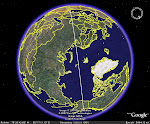I didn't know how to answer that, frankly! I think I glossed over it with some kind of healer-psycho-babble but I'm not sure. What does the pain our bodies carry tell us about the aches in our souls? What does the pain in our body tell us about our spiritual connection (or lack thereof)? As anyone in physical medicine knows, pain is a sign that something isn't right: over stretched, over worked, just plain tired. But how does our spiritual pain manifest to give us those warning signs that our psyche's and spirits are overstretched, over-worked, and just plain tired? I wonder. I know from experience, my own and helping others in their journeys that if we ignore the spiritual pain long enough it becomes physical. But I have to wonder....
So, I pose the question to all our readers:
is the Sacred Space Where it Hurts?




